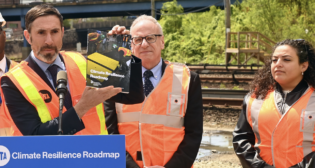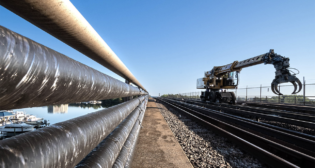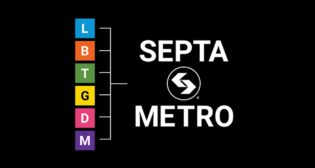
Transit Briefs: CTA, MBTA, LA Metro, TTC
Written by Carolina Worrell, Senior Editor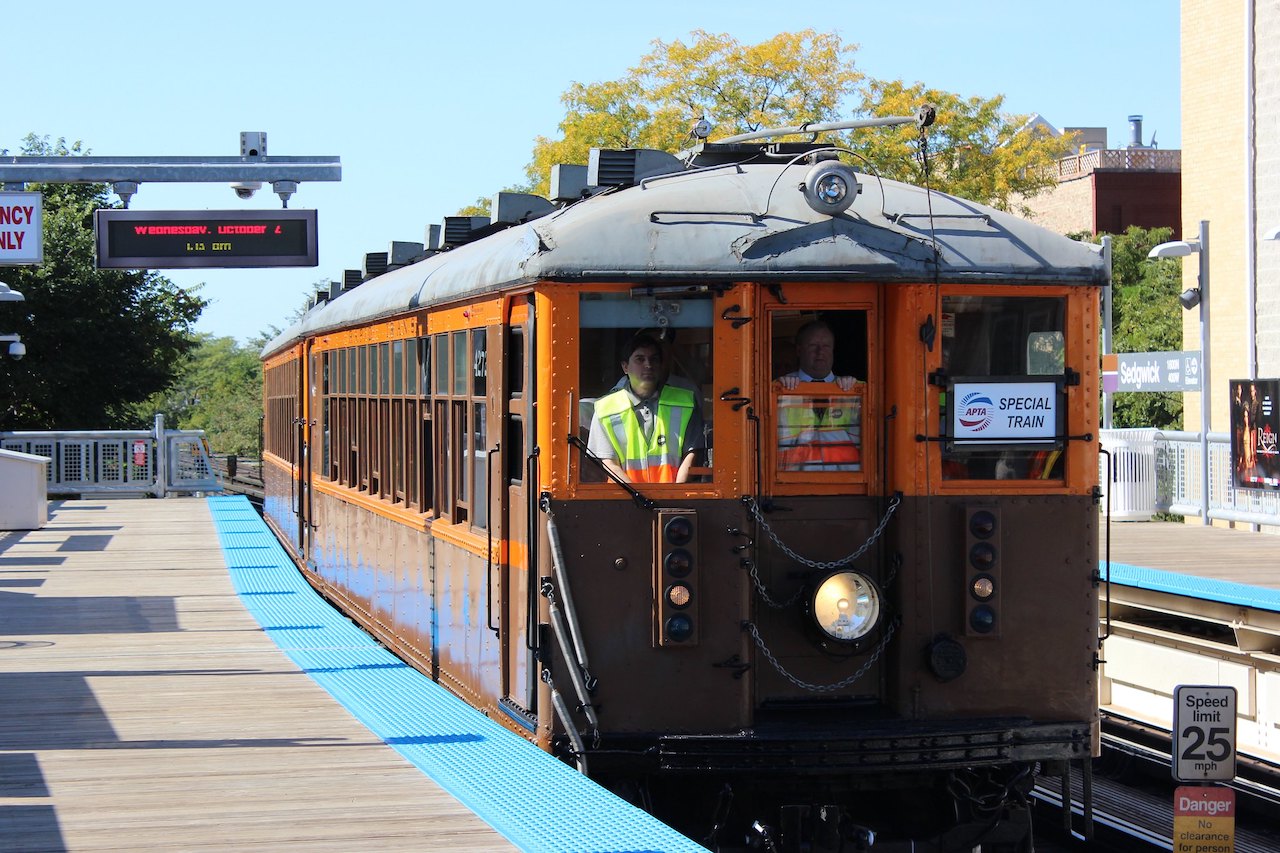
CTA photo
The Chicago Transit Authority (CTA) celebrates its Heritage Fleet railcars’ centennial. Also, the Massachusetts Bay Transportation Authority (MBTA) approves release of Request for Qualifications (RFQ) for a $120 million renewable energy contract; LA Metro commits an additional $134 million for Purple Line Extension Project; and the Toronto Transit Commission’s (TTC) Line 3 Scarborough will remain closed for at least three weeks as derailment investigation continues.
CTA
CTA announced July 27 that it is marking the 100th birthday of its vintage 4000-series railcars by inviting customers to “take a ride back in time.”
On Saturday, July 29, CTA will run the historic 4000-series rail cars around the Loop ‘L’ from 10 a.m. to 2 p.m. Regular CTA rail fare ($2.50 full fare; $1.25 reduced fare) will still apply.
The 4000-series railcars, built by the long-defunct Cincinnati Car Company, are the oldest vehicles in CTA’s Heritage Fleet—a collection of vintage buses and railcars from the 1920s through the 1970s, according to the agency. The 4000-series were built in two phases: from 1914-15 and from 1922-24.
The 4000s were Chicago’s first steel body cars. The first phase of cars were affectionately referred to as “baldies” because of their plain arched roofs, while the second phase of cars were known as the “plushies,” featuring canvas-covered wood roofs, more luxurious interiors with green plush seats, circulating fans, and opal shades on the lights.
The 4000-series railcars in CTA’s Heritage Fleet, cars 4271-4272, have been “lovingly maintained” by the agency since the entire series was retired in the early 1970s. Both vintage railcars feature the burnt orange and brown paint scheme they wore in the 1940s, while inside, they feature replica advertisements from the era.
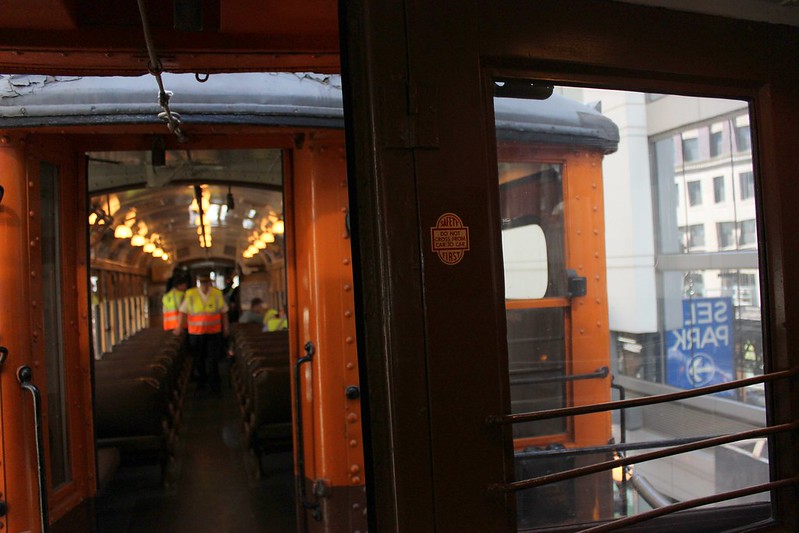
“The 4000-series railcars and the entire Heritage Fleet are a treasure not just in CTA’s history, but the City of Chicago’s history too, and Chicagoans of all ages are welcome to come out and experience this century-old gem,” said CTA President Dorval R. Carter, Jr. “It is a privilege to serve our customers each day, and events such as this are just as much a gift for us as it is for those coming out to ride and experience a bygone era of public transit that is appreciated across multiple generations.”
In addition to being the 100th anniversary of the delivery of 4271-4272, it is also the 50th anniversary of their retirement from regular passenger service, CTA says. The last of the 4000-series cars were retired in October 1973, serving out their last days on the Evanston Express (today’s Purple Line Express). Cars 4271-4272 were selected by CTA for preservation shortly after retirement, chosen in part because they were last pair of 4000s to receive a full overhaul and thus would need the least amount of work to be brought to good operating condition; they had also received fewer modifications than other 4000s.
“The Heritage Fleet Program is designed to preserve and celebrate the city’s and CTA’s history,” said Graham Garfield, who manages CTA’s Heritage Fleet Program. “Our vintage trains and buses allow the public to experience how people traveled in years past first-hand—sitting in the same seats, holding handholds and stanchions, reading the vintage advertisements. These vehicles tell the story of our daily lives—how people traveled to work, school, shopping and play—and we love giving everyone a window in past generations or a walk down memory lane.”
More information on the 4000-series railcars and the CTA Heritage Fleet is available here.
MBTA
The MBTA Board of Directors on July 27 approved the release of an RFQ for an up-to-$120 million wholesale renewable electricity supply contract, upgrading the agency’s “commitment to renewable energy and continuing its leadership in clean transportation.”
According to MBTA, the agency is also further supporting the Commonwealth’s climate change goals and meeting Clean Energy Standard requirements by recommending that 30% of its power be supplied by Massachusetts solar and wind Renewable Energy Certificates (RECs).
Currently, according to the agency, “MBTA is the second largest transportation entity and the fourth largest U.S. government entity powered by renewable energy as well as the 54th largest purchaser of renewable energy overall in the country.”
“As a leader in clean transportation initiatives, this energy procurement upgrades the T’s commitment to renewables since its last energy contract in 2021,” the agency stated in a release.

According to MBTA, the agency currently uses approximately 360,000 megawatt hours (MWh) of electricity annually, making the T “the largest electricity consumer in the Commonwealth.” The MBTA procures its electricity supply in advance “at a fixed price because it makes smart fiscal sense,” providing the T with budget stability and predictability in an energy market that can frequently fluctuate, MBTA said. Alongside much of the Commonwealth and the country as more services convert away from carbon-emitting avenues, MBTA says its electricity usage is also projected to increase as the agency transitions to battery-electric buses, electrified commuter rail vehicles, and more.
“As the Commonwealth’s largest electricity consumer, the MBTA is committed to utilizing 100% renewable energy sources,” the agency said. The MBTA’s proposed electricity procurement includes both the purchase of fixed-price electricity and provisions for the purchase of RECs, which the agency says “ertify that electricity has been purchased from a renewable power source, such as wind or solar, with each certificate equivalent to the generation of 1 MWh of electricity.”
The winning bid in response to the upcoming RFQ will be in place beginning January 1, 2024, for a three-to-five-year period. Responses to the RFQ may include fixed-price electricity blocks, RECs only, or a combination of the two.
The MBTA’s recommendations for the upcoming 2023 procurement include a mix of renewable energy sources—70% hydropower from Maine Class II RECs and 30% solar and wind from Massachusetts Class I RECs. The purchase of these Massachusetts Class I RECs, MBTA says, would help the agency “support the Commonwealth’s climate change goals and meet Clean Energy Standard requirements.” The T’s previous 2021 energy contracts, the agency says, were a “major achievement in offsetting its carbon footprint,” though these contracts provided 100% renewable energy sources through hydropower from Maine Class II RECs only.
For the purchase of power contract to be in place by Dec. 31, MBTA will issue the RFQ on August 4 with responses due August 21. The official purchase will take place on Sept. 13 with a transaction agreement finalized and signed with the winning bidder on Sept. 13.
“This critical procurement in fully renewable energy, further highlighted by our recommendation to purchase 30% Massachusetts Renewable Energy Credits, underscores the T’s commitment to electricity produced from renewable energy sources while being fiscally responsible, understanding our energy needs will continue to grow in the future,” said MBTA General Manager and CEO Phillip Eng. “We’re looking forward to receiving responses to this RFQ, and I thank the dedicated members of our Sustainability and Finance teams for working so diligently to build out this procurement.”
“I applaud the MBTA’s commitment to renewable energy and its efforts to make clean transportation a reality,” said Massachusetts Secretary of Energy and Environmental Affairs Rebecca Tepper. “This procurement is an important part of our whole-of-government approach to combatting the climate crisis. I’m grateful for the collaboration we have across agencies to achieve our ambitious climate goals and deliver clean transportation to the people of Massachusetts.”
LA Metro
LA Metro’s Board of Directors on July 27 approved in a 10-0 vote an additional $134 million for the Purple (D Line) Extension Transit Project “while expressing some concern on how the costs might impact other transportation projects,” according to a MyNewsLA.com report.
According to the report, LA Metro officials said they “needed more funding for the second section of the project—which is the construction and development of the Wilshire/Rodeo and Century City/Constellation stations—due to costs related to real estate acquisitions, differing site conditions during advanced utility relocations and changes to permanent power sources.”
LA Metro, according to the report, will allocate monies for the project from the following sources:
- Approximately $3.4 million from New Starts, a grant from the Federal Transit Administration (FTA).
- Approximately $130.6 million from Measure R, a half-cent sales tax approved by L.A. County voters in 2008 to fund transportation projects and improvements.
The Purple Line Extension Project, which first began construction in 2019, will add seven new subway stations connecting downtown Los Angeles to the Westside.
The first section of the project—Wilshire/La Brea Station, Wilshire/Fairfax Station and Wilshire/LA Cienega Station—is slated to open in 2024 and cost approximately $3.5 billion, according to the report. The second station is slated for completion in 2025.
According to the MyNewsLa.com report, the third section—Westwood/UCLA Station and Westwood/VA Hospital Station—is slated for completion in 2027 and cost approximately $3.7 million.
“In total, the overall extension of the line from Koreatown area to the VA campus is estimated at $9.8 billion, with federal grants covering roughly half the cost,” according to the report.
According to the report, with the Board’s approval, section two has now increased from $2.5 billion to $2.6 billion but LA Metro officials “emphasized they would do their best to mitigate further costs but may come back to the Board if necessary.”
LA Metro officials, according to the report, “noted the project has 20 open claims and 10 notices of intent to claim.” Project staff will continue to assess and manage ongoing risks to control costs.
The request for the $134 million (download below) came before the agency’s Construction Committee, where Director and L.A. County Supervisor Janice Hahn, who chairs the committee, moved to bring the item to the Board, according to the report.
TTC
TTC on July 27 confirmed that the comprehensive investigation into a July 24 derailment on Line 3 Scarborough will take at least another three weeks to complete. A decision about the reinstatement of train service will only be made once the review is complete.
On July 24 at 6:45 p.m. a southbound SRT train leaving Ellesmere Station had its trailing car derail approximately 500 feet from the station.
In addition to the investigation, TTC says it is is using this time to “inspect the entire SRT fleet and the infrastructure’s structural integrity.” The results of the investigation will inform next steps.
“I want to thank Scarborough residents for their patience as the TTC continues to investigate this very serious incident,” said Mayor Olivia Chow. “The safety of the public transit system is everyone’s top concern and the SRT service can only return when we know it is safe to do so.”
“The TTC Board stands behind every effort to ensure the root cause of this derailment is fully and thoroughly looked into,” said TTC Chair Jon Burnside. “CEO Rick Leary and his team are keeping us fully informed every step of the way and I am confident they will not rush into a decision without all the facts.”
“We have enlisted the support and help of some of the transportation industry’s leading experts in rail, infrastructure and vehicles to assist and ensure we are leaving no stone unturned,” said TTC CEO Rick Leary. “Safety is paramount to all we do and only once we know exactly what happened can we make a decision about the future operations of this line. In the meantime, we are making contingency plans to ensure we are providing the people of Scarborough with frequent and reliable transit options.”
